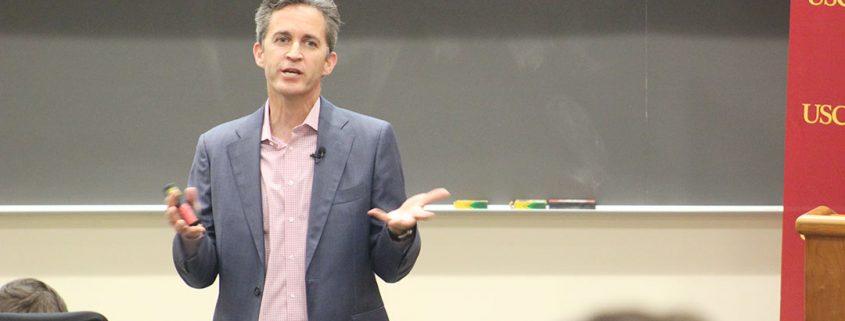UN rapporteur discusses free speech in digital age on campus
David Kaye, United Nations special rapporteur on the right to freedom of expression and opinion, addressed ways to combat the infringement of digital rights in a speech titled the “Challenges to Freedom of Expression in a Digital Age.”
The speech kicked off a human rights speaker series sponsored by the Price School of Public Policy and the Dornsife School of Letters, Arts and Sciences. Both school representatives in attendance stressed the importance of discussing human rights on USC’s campus.
“We’re focused on improving the lives of people here in our community, but also in the world,” said Donnajean Ward, executive director in the Office of the Dean at Price. “Human rights are issues that are not just global issues, but also local issues.”
Kaye, who currently teaches at the UC Irvine School of Law, has discussed freedom of expression in many countries throughout the world. The cornerstone of his talk was on digital rights, based off of Article 19, which provides broad freedom of expression in every digital frontier.
For the first part of the talk, Kaye discussed how different world powers break the provisions of Article 19. One of the ways in which this occurs is when governments censor information on social media.
“The problem is that governments are increasingly putting pressure on social media sites,” Kaye said. “They’re going to them and saying ‘We have restrictions in our country, and you have to take down your content.’”
Another concerning infringement of Article 19, Kaye said, is digital surveillance. He said states are using surveillance to reduce freedom of expression. For example, Yahoo recently came to an agreement with the National Security Agency that would allow the NSA to parse through emails on Yahoo’s server. Though mass surveillance is a threat to one’s ability to seek and receive information, Kaye said, targeted surveillance is even more problematic.
“Direct attacks on digital rights is something very real and curtails both journalists and activists and others around the world,” Kaye said.
But Kaye argued that, while some content must be censored, some standards need to be put into place.
“The problem is when governments ask media and other digital rights companies to take down that content, they’re not giving them any standards by which to do it,” Kaye said.
Surveillance and censoring by the government are covered the most when considering the ways that freedom is restricted, but Kaye said that access to the internet is an equally concerning lack of digital expression. Millions of people in the United States are unable to access the internet due to low socioeconomic status, disability or age, and Kaye said that lack of digital access divides people globally, as most of the world economy is now facilitated through the web.
According to Kaye, there are three key ways to fix current threats to digital expression not only in the United States, but across the world. He said Americans need to pay attention to global human rights norms as outlined in Article 19, use legal and political strategies without and within the UN and focus on public campaigning as organizations like Amnesty International and Human Rights Watch have done and, most importantly, that the international community needs to properly respond to digital attacks.
“We need to call out attacks on governments with the complicity of private actors,” Kaye said. “Every attack requires a response.”
Kaye said that the digital age challenges to freedom are extremely important because in this generation, people all use technology to some degree.
“The fact that most people are online gives us the incentive to know who’s surveilling us, who’s following what we’re doing and also to know what choices we make that undermine our privacy or interfere with our freedom of expression,” Kaye said.
Correction: A previous headline of this article stated that David Kaye was a former rapporteur. He is still in the position. The Daily Trojan regrets this error.

